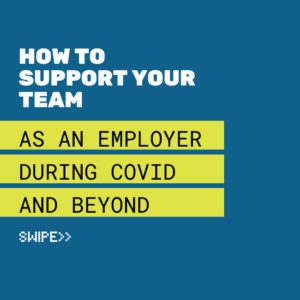Writer: Lisa Quigley
How to Support your Team as an Employer during Covid and Beyond


As we’ve been living through COVID, there’s been a huge focus on individual support and what we can each do for our own mental health. But if we want to see real support and changes in the restaurant industry, we need to look to employers too. The hospitality sector needs systemic change and leadership accountability for lasting impact.
There’s a lot of responsibility that comes with being an employer. It isn’t just about writing the schedule and signing off on paychecks. Especially in the current climate, there are a lot of unknowns and high uncertainty.. Are we going to get shut down again? Will I be hired back when we reopen? Will I be able to pay my rent?
Even so, employers can still anticipate common questions and concerns from their staff. Part of creating psychologically safe environments is to be aware and prepared to address such questions. It doesn’t need to be the perfect answer. Sometimes the answer is, ‘I don’t have an answer to that yet, but I will reach out as soon as I do.” Cover, calm, connect, competence, and confidence. The honesty, connection, and accountability in that response holds more weight than giving false hope, false information, or worse, silence. Share information as it comes to keep everyone in the loop, encourage them to stay in contact, and check in with them individually and as a team.
As an employer, it is your responsibility to inform your staff of information as it comes to ensure no one feels left in the dark. It is okay if that information changes, and you need to update the team again! While sharing evolving information can feel or come across as inconsistent or misleading, it actually shows your dedication to your team. You are giving your best understanding of timelines and any variables. When an employer presents it as such, and that it is subject to change, not only are you reassuring your staff, you are also demonstrating accountability and transparency, which leads to more trust and open communication.
There are no set rules for working through a pandemic. Even in normal times, work environments will go through changes that may incite various emotions. Calm your staff by letting them know that the feelings they are experiencing are valid and that they should be patient with themselves while they work through them. Sometimes, we can’t fully grasp why we feel a certain way, and that is okay. It can be unsettling, but to know your employer supports you regardless is an important foundation while you navigate and process. Feeling reassured and calmed opens the door for more candid, vulnerable conversations in spaces that it may really count.
Encourage employees to keep in touch with their co-workers whether it be through text, video calls, email or social media. It is nice to connect with colleagues as a source of companionship, not just for work-related things. Also remember that everyone connects and receives support differently, so the way you want someone to show up for you may be totally different for them. Communicating our needs can be hard, but is a practice that can really strengthen relationships. Remind your employees that you are in it together, and they are a valued part of the team.
Demonstrate your care for your workers by offering all of the resources available at your organization and encourage employees to use them. As an employer, you have a duty of care to your employees. Have a database of up-to-date and industry-specific resources (ex., a workplace peer, chaplain, and/or an EAP counselor) on hand so that whether it is a pandemic that affects everyone, or a specific situation of an employee, you already have a reference point to direct them, and to learn for yourself as the employer. Ask colleagues to share any coping strategies they have found helpful with each other, and most importantly, ask what you could do that would help.
The last point is all about your team’s confidence in themselves, and in the leadership. Ask your employees if they feel confident in their ability to do their job in the same way as before the pandemic. Find out if working affects other areas of their lives now in different ways, which may in turn influence their confidence at work. Remind your staff to be patient with themselves, and that we are all doing our best during unprecedented times. All we can do is take it one day at a time. As an employer, you can increase confidence by checking in regularly, increase positive feedback and reinforcement and recognize your employee’s contributions by demonstrating gratitude.
[1]https://www.ptsd.va.gov/covid/COVID_leaders_support_staff.asp#two
Not 9 to 5 is here to help by making mental health education more accessible. We take an intersectional and inclusive approach and aim to change the hospitality industry from the inside. Our content is all self-led and designed with expertise from industry leaders, education specialists, mental health, DEI and legal professionals. CNECTed is the world’s first mental health certification program for the entire hospitality industry. It is for employers, employees, organizations… everyone! Created for us by us. Change Needs Everyone Coming Together. Get CNECTed certified by signing up for early access to CNECTing, our community platform by clicking here.
For additional ideas and resources to help support your team, read: What is an EAP? And why you should want it for you & your staff
ID: 8 text based slides
1/8: How to support your team as an employer during COVID and beyond. Swipe.
2/8: Your responsibility to your team extends to their well-being.It’s not just physical safety, and schedules. Mental health is impacted too.
3/8: 1.Cover: Cover all questions and concerns. Share the information you have and keep your staff up to date.
4/8: 2. Calm: your team needs to be able to speak freely and express their concerns.
5/8: 3. Connect: encourage your team to stay in contact and support each other. Peer support is an important source of connection.
6/8: 4. Competence: Share the resources available to you and set the example by encouraging their use.
7/8: 5. Check-in with your team and focus on their confidence and security concerning their ability to work and thrive.
8/8: CNECTed is the world’s first mental health certification program for the hospitality industry. Created for us by us. Change Needs Everyone Coming Together. Get CNECTed certified. #IamCNECTed
References









